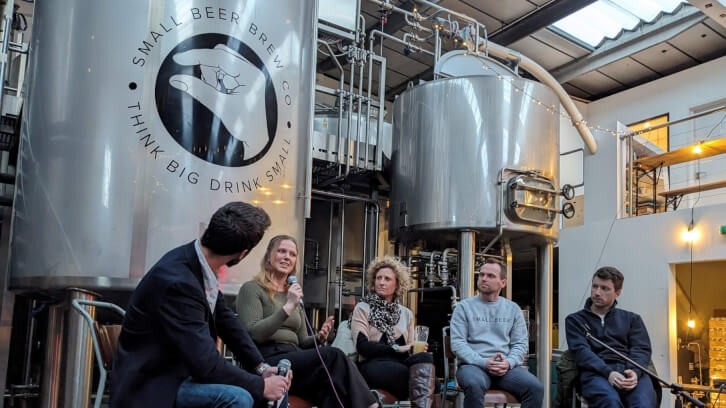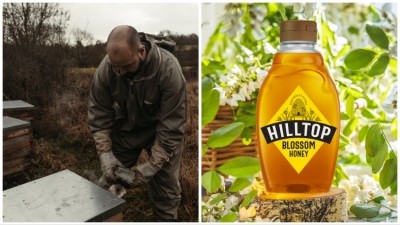Short read
Can one business make a difference?

To mark B Corp month, London brewery Small Beer brought together a panel of fellow B Corp certified businesses to highlight the steps they’re taking to positively impact their social and environmental bearing.
Among the key takeaways was the notion that smaller companies have more power than they might think.
To somewhat quote Shakespeare: though they be but little, they are fierce.
“As a small player, you can have a voice and create some sort of change. Will you make a huge difference – probably not, but you might create a snowball effect,” commented James Cadbury founder of Love Cocoa and HiP Chocolate, who was among the four-strong panel.
The consensus of the panel was that it was more important to set up a well-meaning business – one that treats workers fairly, that has ‘green’ instilled within its roots – and push for that to be adopted more widely.
The great great great grandson of John Cadbury continued that when multiple SMEs take a certain approach, it almost leaves the bigger players no choice but to pursue it themselves.
Tony’s Chocolonely’s was highlighted as a great example this, with its ‘100% slave free’ campaign making a mark in the chocolate industry.
However, it was noted by Volcano Coffee’s co-founder, Emma Loisel, that while the excellent marketing has been a strong reason for the chocolate brand’s success, it is also a great tasting product – and taste is something consumers are not willing to compromise on.
Felix James, co-founder of Small Beer, agreed there is power among the ‘small voices’, extending this notion not just to competitors but to suppliers.
“We need to put pressure on our suppliers,” he contended, as he recalled the difficulties Small Beer had in convincing its packaging provider to create an all-recyclable solution.
He explained that it wasn’t something the supplier had offered previously, and they had warned it would be a more expensive option.
After pressing for them to proceed anyway, it actually ended up being cheaper for Small Beer. This was because the supplier found there was an appetite for fully recyclable options among their other cliental, meaning it could be manufactured on mass.
On a similar vein, James also raised concerns over the lack of, not only British hops, but organic British hops used in UK beer production.
“We [Small Beer] actually bought all the British hops available on the local market – that tells you all you need to know; at our scale we shouldn’t have been able to do that.”
A lot of the organic hops used in UK beers are from other regions, such as the US which has invested a lot in the cultivation of this crop, James explained.
Still, he argued it was nonsensical approach: “Why would you put so much care and effort into something only to import it?”
The main reason behind our love for imported hops is because it’s not been an overly developed area for Britain.
“It takes a long time to develop [decent] hops,” James said.
“British hops are a little more delicate,” he added, “but we have proven you can get good results from it.” Its organic IPA is among its most popular SKUs, with the tipple even winning an award in 2021.
Moreover, although Small Beer has managed to convince more farmers to invest in organic hops – it can’t be a mainstream market until other businesses push for this too.
“You’re not going to get a decent yield for a couple of years – so you’re investing in the future. But you can’t [as a farmer] just rely on one little London brewery,” James admitted, “because you never know what might happen in the future.”
And while Small Beer is investing in organic beer, Volcano Coffee warned that what might seem ‘right’ isn’t always the best course, depending on your particular business and sector.
For example, in Volcano’s case, whilst Loisel said many of their coffees were from farms that are in essence organic, the farmers cannot afford the expense of certifying themselves. Demanding this from them would have a negative impact on small hold farmers.
“You need to think through certifications and their impact,” she cautioned.
This is because the certification can only be at the farmer level, so if Volcano Coffee restricted itself to only certified organic farmers, it would be forced to buy from only large commercial farms not small holders – the very people Volcano Coffee is committed to supporting.
So can one person – or in this case, business – make a difference? In short, yes; change needs to start from somewhere, after all. The issue is that the ‘snowball’ takes time to grow – and with the impacts of climate change extremely evident today, that’s not really a luxury we can afford.
Collaboration with other smaller players appears to be key for start-ups wanting to rewrite the narrative: there is strength in numbers. But it also requires an added level of scrutiny from the consumer – an ability to delve a little deeper into what a brand does and stands for.
That is certainly beginning to happen, but will it be enough to tip the scales in favour of pioneering start-ups – well, no. Not if it doesn’t taste good. In essence, you need the whole package.
In other news, Doughlicious has undergone a rebrand - we hear from founder Kathryn Bricken on why it was time for an 'upgrade'.

















